Director's Duties Under Corporations Act: Whitehouse v Carlton Hotel
VerifiedAdded on 2023/06/12
|12
|1513
|471
Case Study
AI Summary
This case study provides an in-depth analysis of the Whitehouse v. Carlton Hotel Proprietary Limited case, focusing on the breach of director's duties under Section 181(1) of the Corporations Act 2001 (Cth). The case revolves around Charles Whitehouse, the governing director of Carlton Hotel, who issued B class shares to his sons to prevent his ex-wife from gaining control of the company after his death. The court found that Whitehouse acted with an improper purpose, prioritizing personal motives over the company's best interests, thus breaching his fiduciary duty. The decision clarified the "but for" test, emphasizing that an impermissible purpose must be the dominant cause for an action to be deemed a breach. This case remains a significant precedent in Australian corporate law, influencing subsequent judgments and legal interpretations regarding director's responsibilities and the proper use of their powers. Desklib provides access to similar case studies and solved assignments for students.
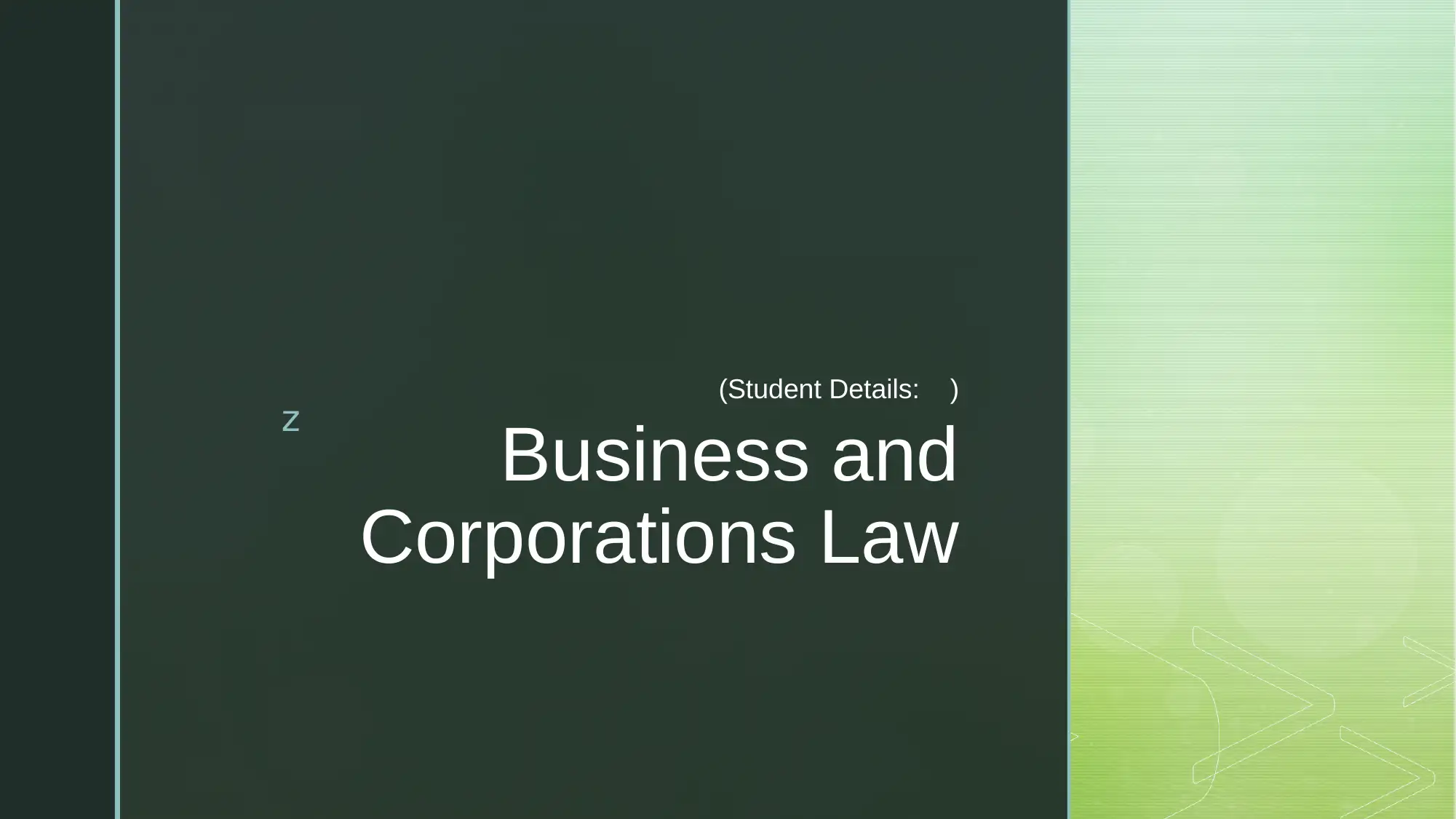
z
Business and
Corporations Law
(Student Details: )
Business and
Corporations Law
(Student Details: )
Paraphrase This Document
Need a fresh take? Get an instant paraphrase of this document with our AI Paraphraser
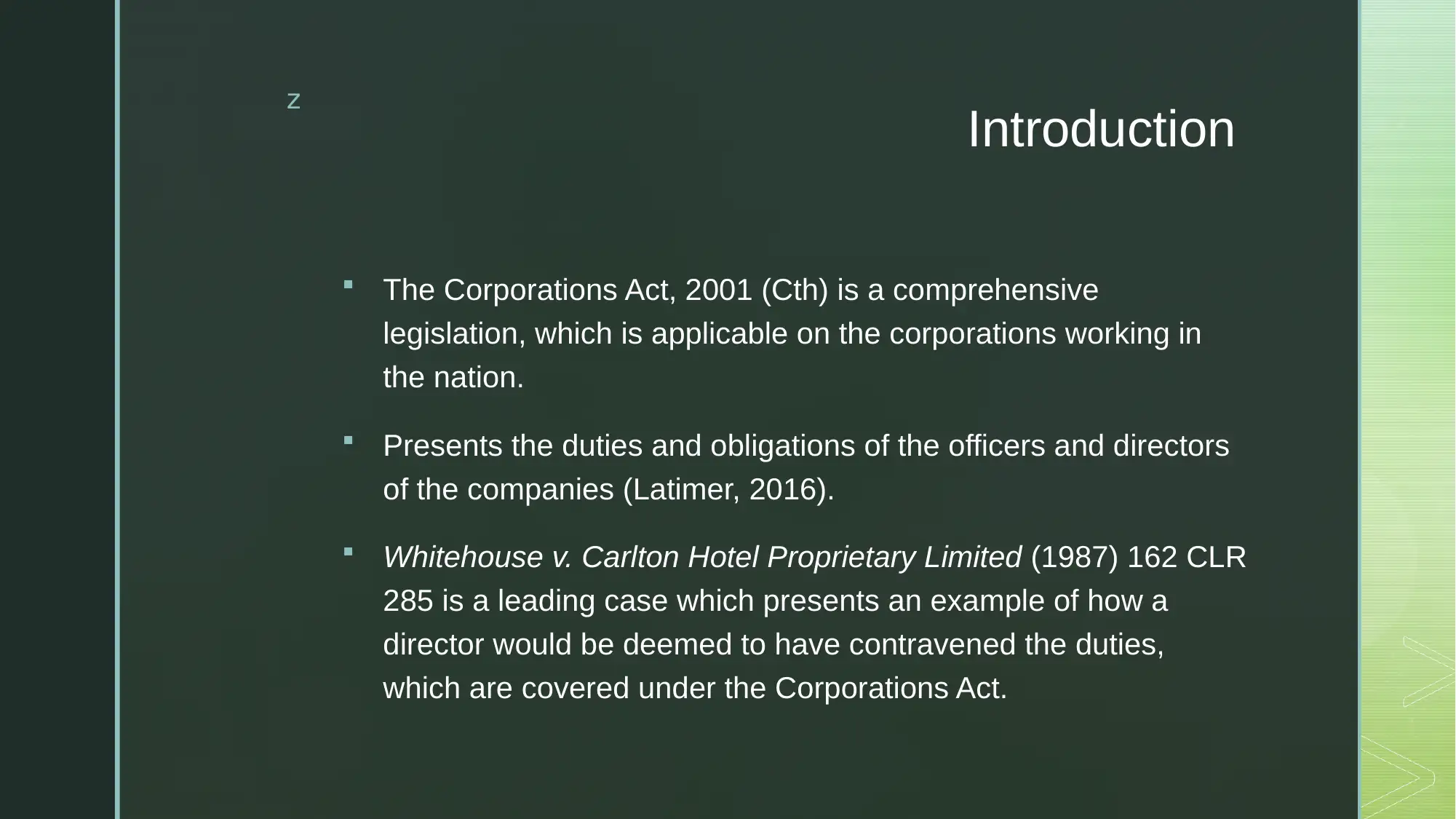
z
Introduction
The Corporations Act, 2001 (Cth) is a comprehensive
legislation, which is applicable on the corporations working in
the nation.
Presents the duties and obligations of the officers and directors
of the companies (Latimer, 2016).
Whitehouse v. Carlton Hotel Proprietary Limited (1987) 162 CLR
285 is a leading case which presents an example of how a
director would be deemed to have contravened the duties,
which are covered under the Corporations Act.
Introduction
The Corporations Act, 2001 (Cth) is a comprehensive
legislation, which is applicable on the corporations working in
the nation.
Presents the duties and obligations of the officers and directors
of the companies (Latimer, 2016).
Whitehouse v. Carlton Hotel Proprietary Limited (1987) 162 CLR
285 is a leading case which presents an example of how a
director would be deemed to have contravened the duties,
which are covered under the Corporations Act.
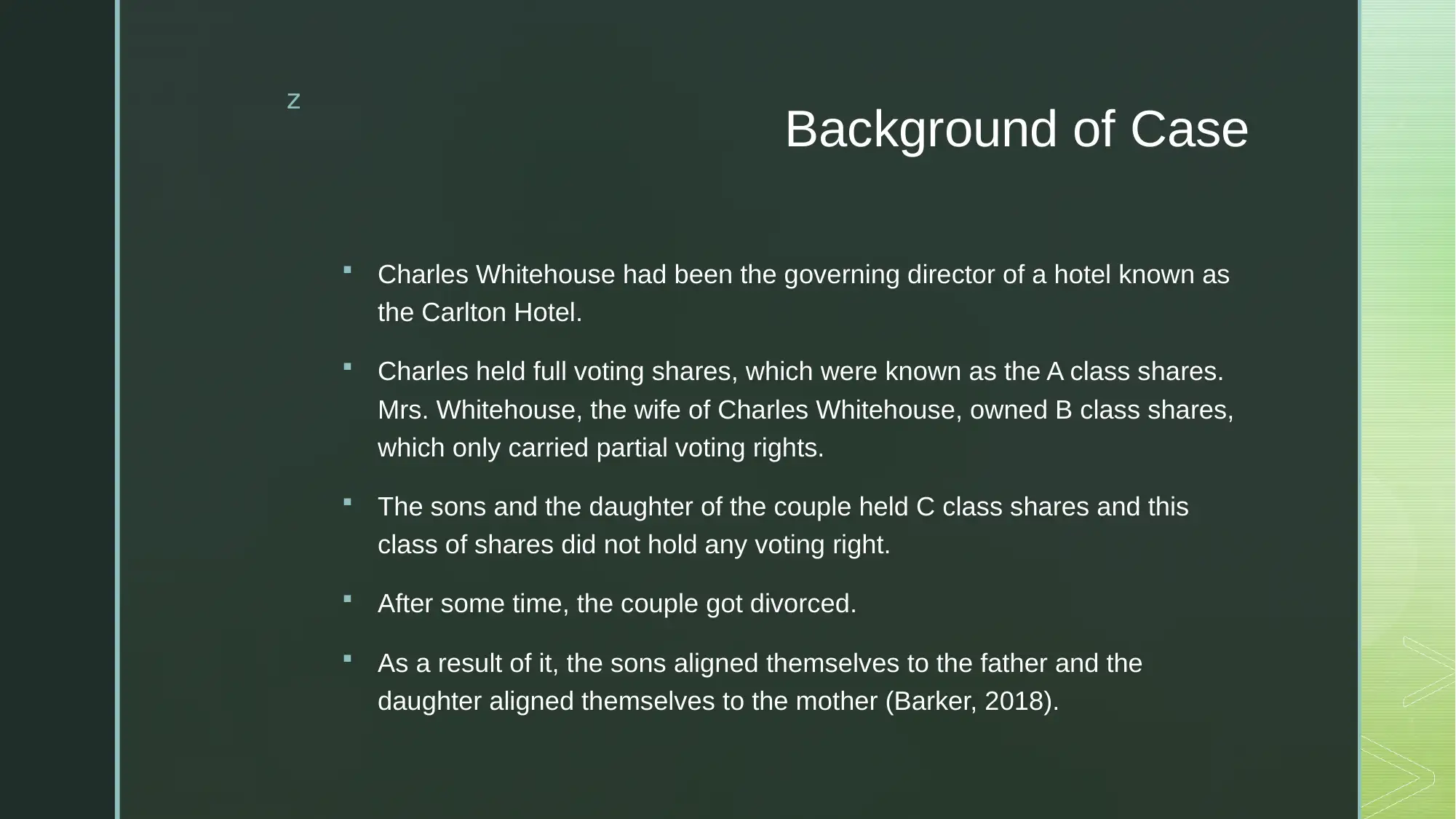
z
Background of Case
Charles Whitehouse had been the governing director of a hotel known as
the Carlton Hotel.
Charles held full voting shares, which were known as the A class shares.
Mrs. Whitehouse, the wife of Charles Whitehouse, owned B class shares,
which only carried partial voting rights.
The sons and the daughter of the couple held C class shares and this
class of shares did not hold any voting right.
After some time, the couple got divorced.
As a result of it, the sons aligned themselves to the father and the
daughter aligned themselves to the mother (Barker, 2018).
Background of Case
Charles Whitehouse had been the governing director of a hotel known as
the Carlton Hotel.
Charles held full voting shares, which were known as the A class shares.
Mrs. Whitehouse, the wife of Charles Whitehouse, owned B class shares,
which only carried partial voting rights.
The sons and the daughter of the couple held C class shares and this
class of shares did not hold any voting right.
After some time, the couple got divorced.
As a result of it, the sons aligned themselves to the father and the
daughter aligned themselves to the mother (Barker, 2018).
⊘ This is a preview!⊘
Do you want full access?
Subscribe today to unlock all pages.

Trusted by 1+ million students worldwide
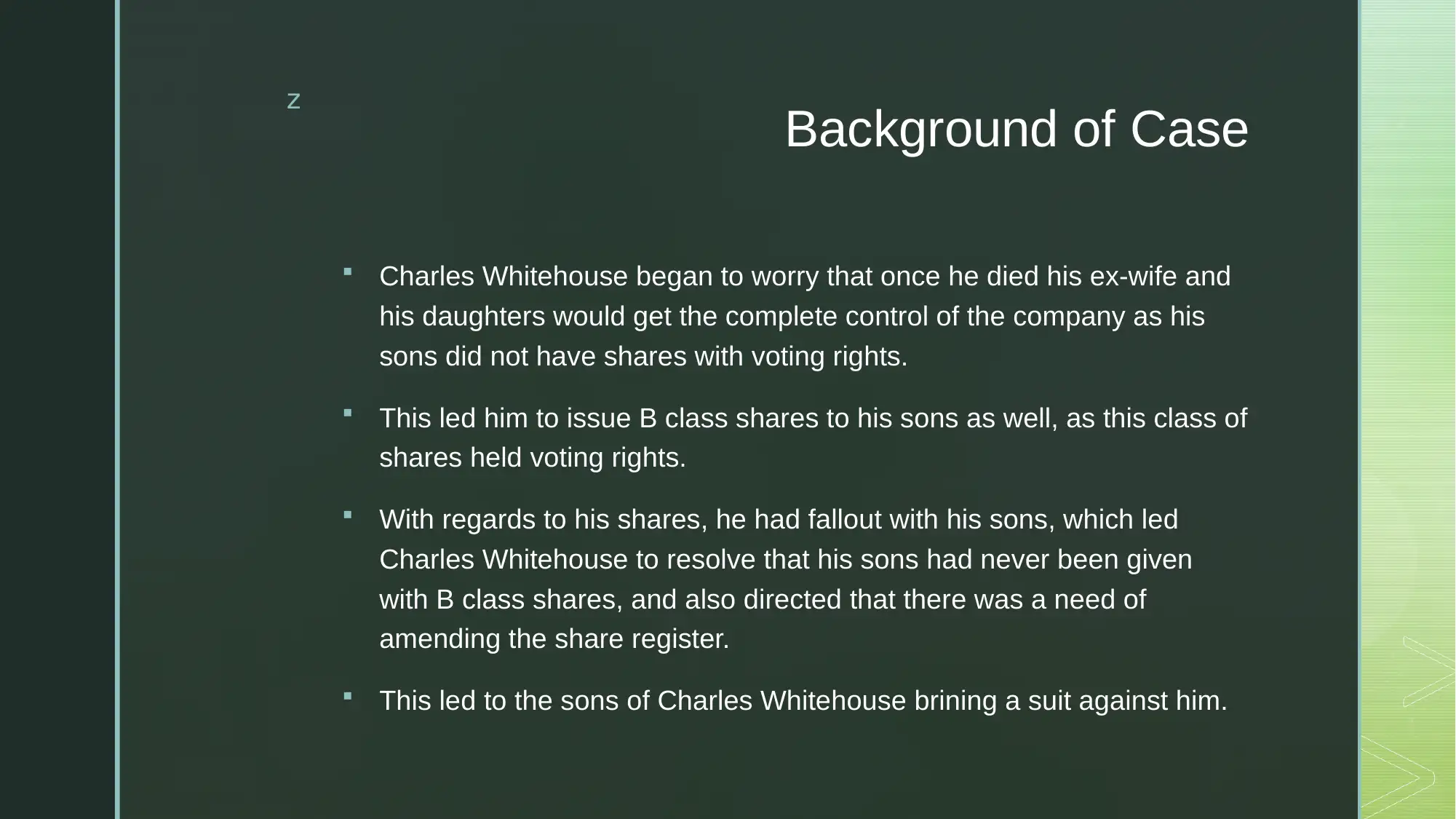
z
Background of Case
Charles Whitehouse began to worry that once he died his ex-wife and
his daughters would get the complete control of the company as his
sons did not have shares with voting rights.
This led him to issue B class shares to his sons as well, as this class of
shares held voting rights.
With regards to his shares, he had fallout with his sons, which led
Charles Whitehouse to resolve that his sons had never been given
with B class shares, and also directed that there was a need of
amending the share register.
This led to the sons of Charles Whitehouse brining a suit against him.
Background of Case
Charles Whitehouse began to worry that once he died his ex-wife and
his daughters would get the complete control of the company as his
sons did not have shares with voting rights.
This led him to issue B class shares to his sons as well, as this class of
shares held voting rights.
With regards to his shares, he had fallout with his sons, which led
Charles Whitehouse to resolve that his sons had never been given
with B class shares, and also directed that there was a need of
amending the share register.
This led to the sons of Charles Whitehouse brining a suit against him.
Paraphrase This Document
Need a fresh take? Get an instant paraphrase of this document with our AI Paraphraser
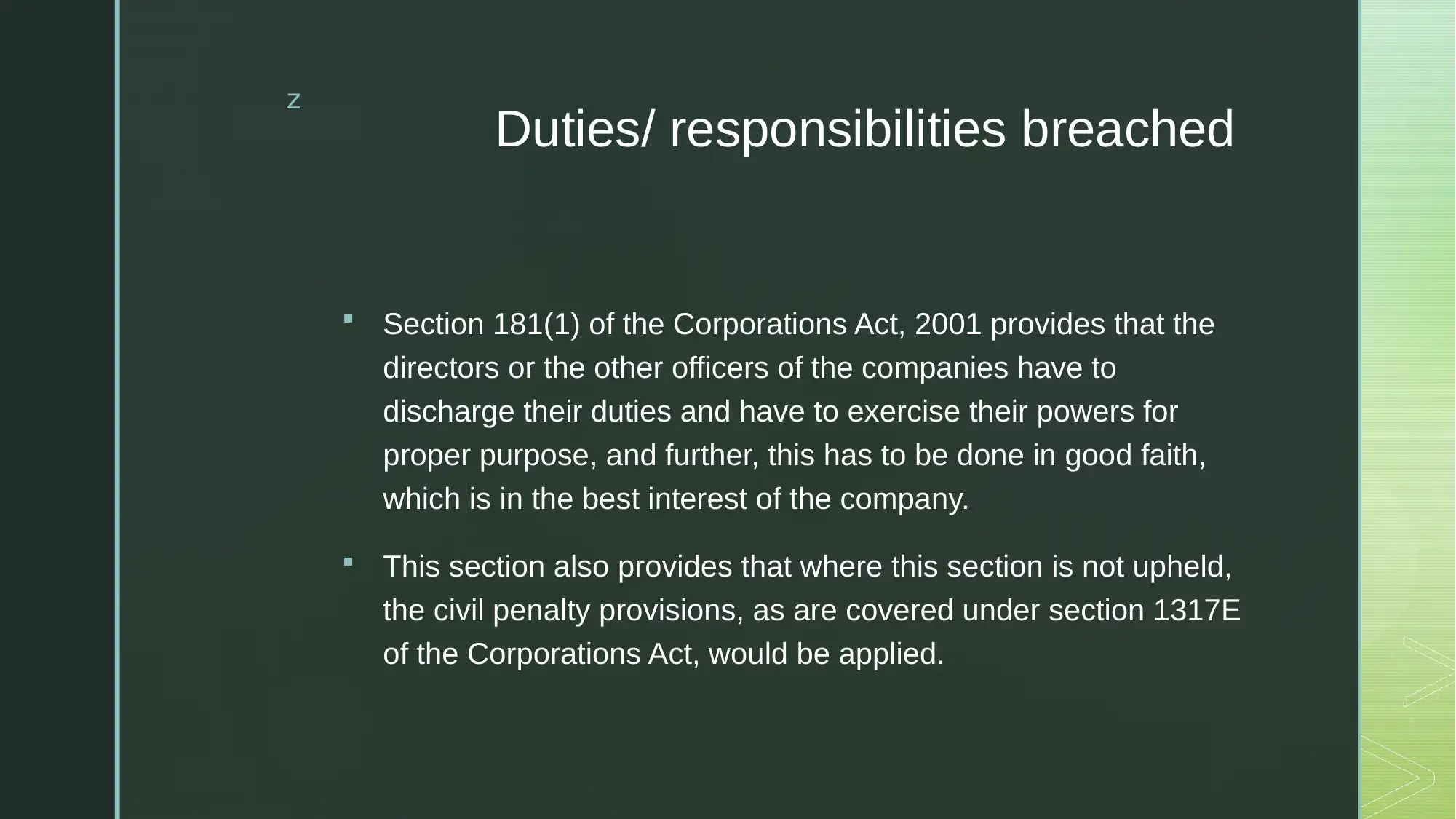
z
Duties/ responsibilities breached
Section 181(1) of the Corporations Act, 2001 provides that the
directors or the other officers of the companies have to
discharge their duties and have to exercise their powers for
proper purpose, and further, this has to be done in good faith,
which is in the best interest of the company.
This section also provides that where this section is not upheld,
the civil penalty provisions, as are covered under section 1317E
of the Corporations Act, would be applied.
Duties/ responsibilities breached
Section 181(1) of the Corporations Act, 2001 provides that the
directors or the other officers of the companies have to
discharge their duties and have to exercise their powers for
proper purpose, and further, this has to be done in good faith,
which is in the best interest of the company.
This section also provides that where this section is not upheld,
the civil penalty provisions, as are covered under section 1317E
of the Corporations Act, would be applied.
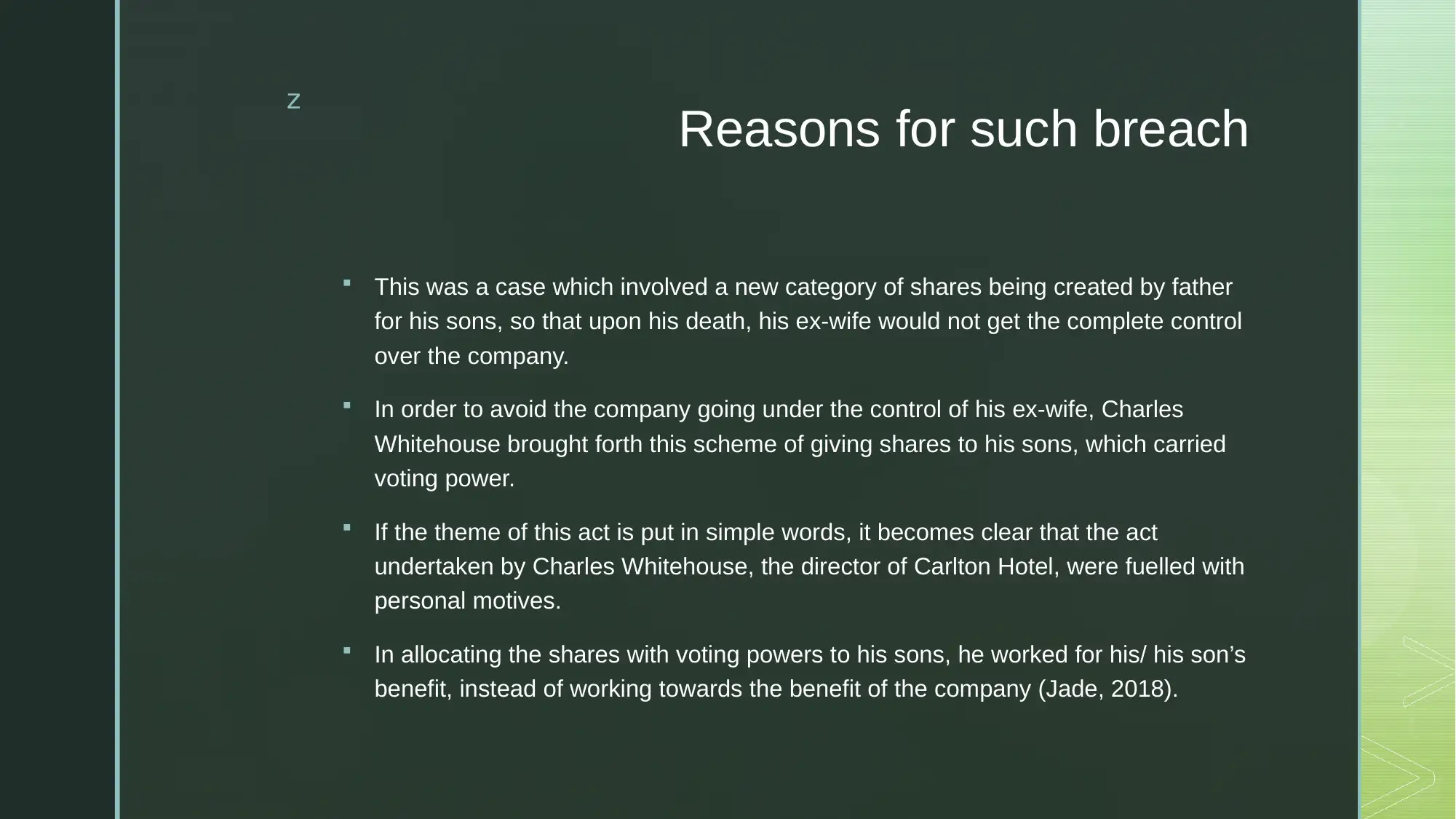
z
Reasons for such breach
This was a case which involved a new category of shares being created by father
for his sons, so that upon his death, his ex-wife would not get the complete control
over the company.
In order to avoid the company going under the control of his ex-wife, Charles
Whitehouse brought forth this scheme of giving shares to his sons, which carried
voting power.
If the theme of this act is put in simple words, it becomes clear that the act
undertaken by Charles Whitehouse, the director of Carlton Hotel, were fuelled with
personal motives.
In allocating the shares with voting powers to his sons, he worked for his/ his son’s
benefit, instead of working towards the benefit of the company (Jade, 2018).
Reasons for such breach
This was a case which involved a new category of shares being created by father
for his sons, so that upon his death, his ex-wife would not get the complete control
over the company.
In order to avoid the company going under the control of his ex-wife, Charles
Whitehouse brought forth this scheme of giving shares to his sons, which carried
voting power.
If the theme of this act is put in simple words, it becomes clear that the act
undertaken by Charles Whitehouse, the director of Carlton Hotel, were fuelled with
personal motives.
In allocating the shares with voting powers to his sons, he worked for his/ his son’s
benefit, instead of working towards the benefit of the company (Jade, 2018).
⊘ This is a preview!⊘
Do you want full access?
Subscribe today to unlock all pages.

Trusted by 1+ million students worldwide
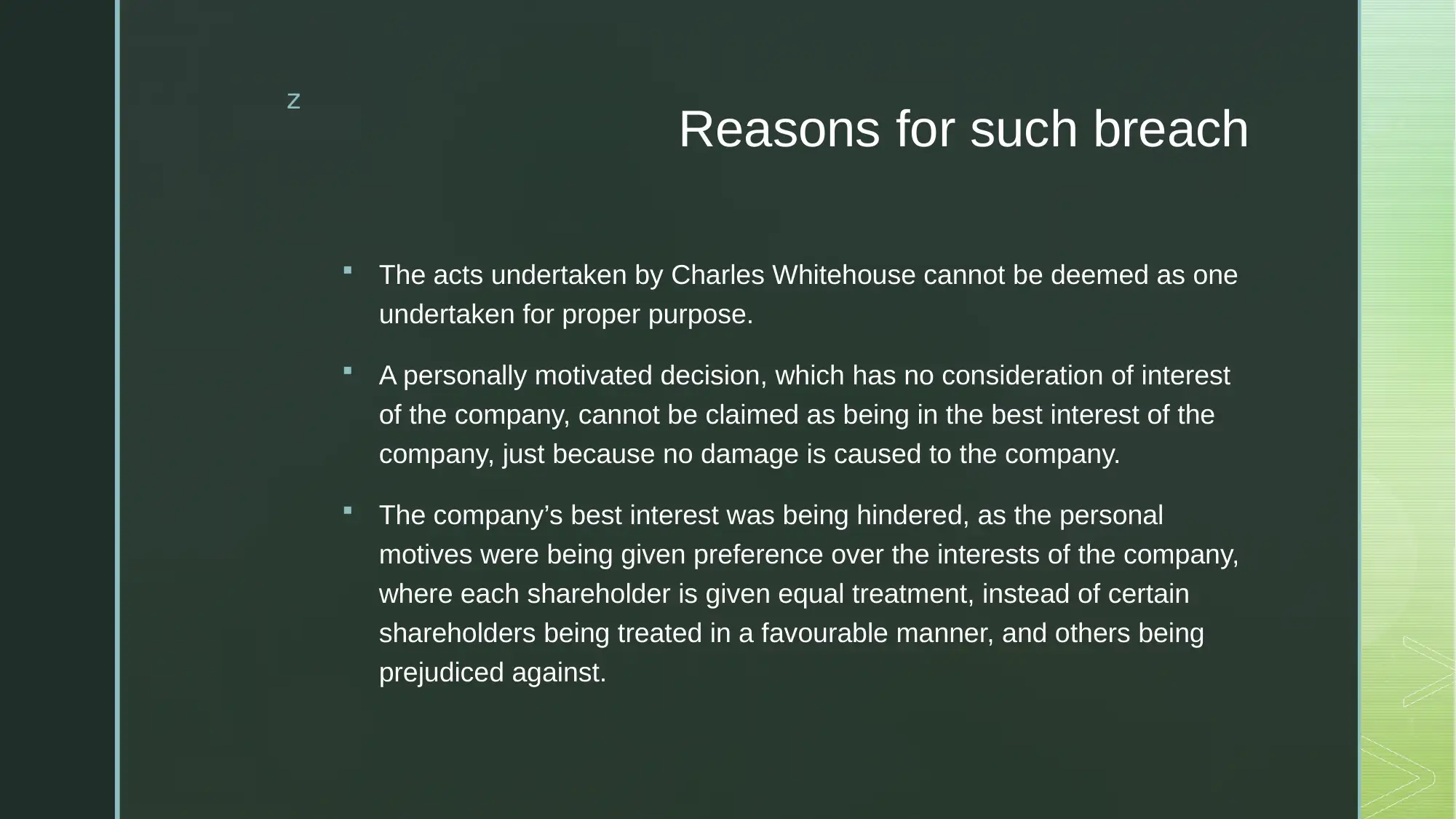
z
Reasons for such breach
The acts undertaken by Charles Whitehouse cannot be deemed as one
undertaken for proper purpose.
A personally motivated decision, which has no consideration of interest
of the company, cannot be claimed as being in the best interest of the
company, just because no damage is caused to the company.
The company’s best interest was being hindered, as the personal
motives were being given preference over the interests of the company,
where each shareholder is given equal treatment, instead of certain
shareholders being treated in a favourable manner, and others being
prejudiced against.
Reasons for such breach
The acts undertaken by Charles Whitehouse cannot be deemed as one
undertaken for proper purpose.
A personally motivated decision, which has no consideration of interest
of the company, cannot be claimed as being in the best interest of the
company, just because no damage is caused to the company.
The company’s best interest was being hindered, as the personal
motives were being given preference over the interests of the company,
where each shareholder is given equal treatment, instead of certain
shareholders being treated in a favourable manner, and others being
prejudiced against.
Paraphrase This Document
Need a fresh take? Get an instant paraphrase of this document with our AI Paraphraser
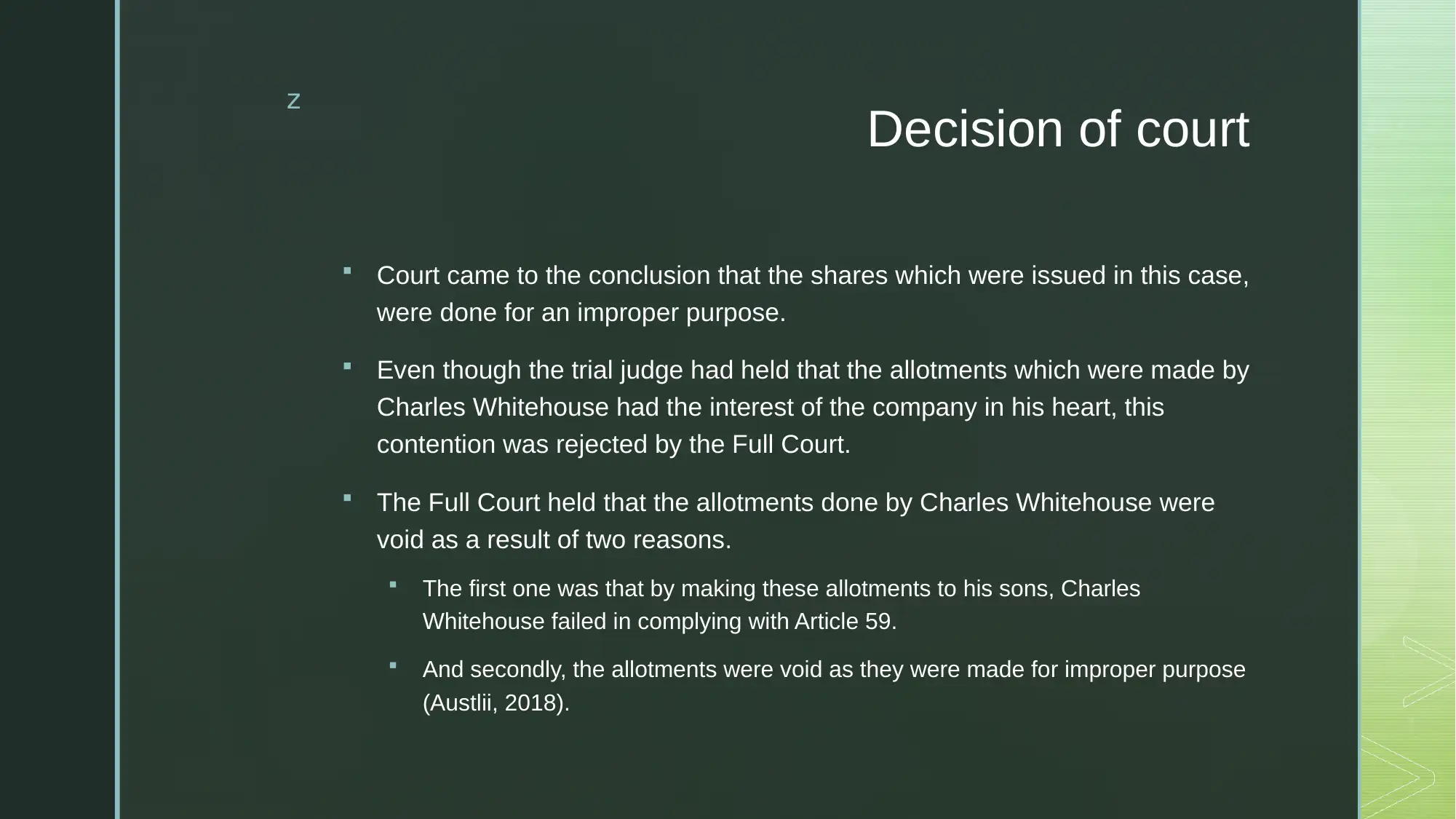
z
Decision of court
Court came to the conclusion that the shares which were issued in this case,
were done for an improper purpose.
Even though the trial judge had held that the allotments which were made by
Charles Whitehouse had the interest of the company in his heart, this
contention was rejected by the Full Court.
The Full Court held that the allotments done by Charles Whitehouse were
void as a result of two reasons.
The first one was that by making these allotments to his sons, Charles
Whitehouse failed in complying with Article 59.
And secondly, the allotments were void as they were made for improper purpose
(Austlii, 2018).
Decision of court
Court came to the conclusion that the shares which were issued in this case,
were done for an improper purpose.
Even though the trial judge had held that the allotments which were made by
Charles Whitehouse had the interest of the company in his heart, this
contention was rejected by the Full Court.
The Full Court held that the allotments done by Charles Whitehouse were
void as a result of two reasons.
The first one was that by making these allotments to his sons, Charles
Whitehouse failed in complying with Article 59.
And secondly, the allotments were void as they were made for improper purpose
(Austlii, 2018).
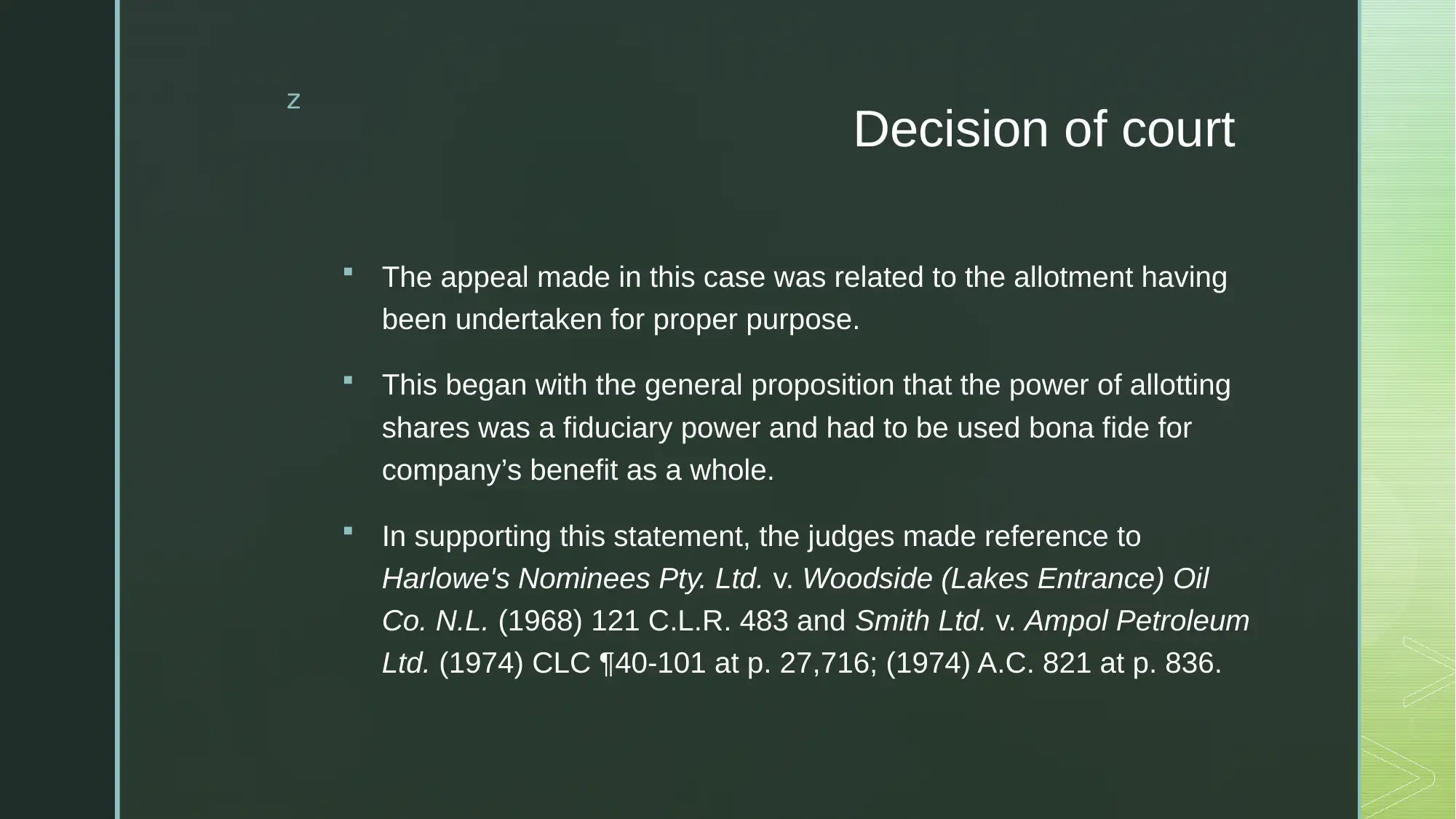
z
Decision of court
The appeal made in this case was related to the allotment having
been undertaken for proper purpose.
This began with the general proposition that the power of allotting
shares was a fiduciary power and had to be used bona fide for
company’s benefit as a whole.
In supporting this statement, the judges made reference to
Harlowe's Nominees Pty. Ltd. v. Woodside (Lakes Entrance) Oil
Co. N.L. (1968) 121 C.L.R. 483 and Smith Ltd. v. Ampol Petroleum
Ltd. (1974) CLC ¶40-101 at p. 27,716; (1974) A.C. 821 at p. 836.
Decision of court
The appeal made in this case was related to the allotment having
been undertaken for proper purpose.
This began with the general proposition that the power of allotting
shares was a fiduciary power and had to be used bona fide for
company’s benefit as a whole.
In supporting this statement, the judges made reference to
Harlowe's Nominees Pty. Ltd. v. Woodside (Lakes Entrance) Oil
Co. N.L. (1968) 121 C.L.R. 483 and Smith Ltd. v. Ampol Petroleum
Ltd. (1974) CLC ¶40-101 at p. 27,716; (1974) A.C. 821 at p. 836.
⊘ This is a preview!⊘
Do you want full access?
Subscribe today to unlock all pages.

Trusted by 1+ million students worldwide
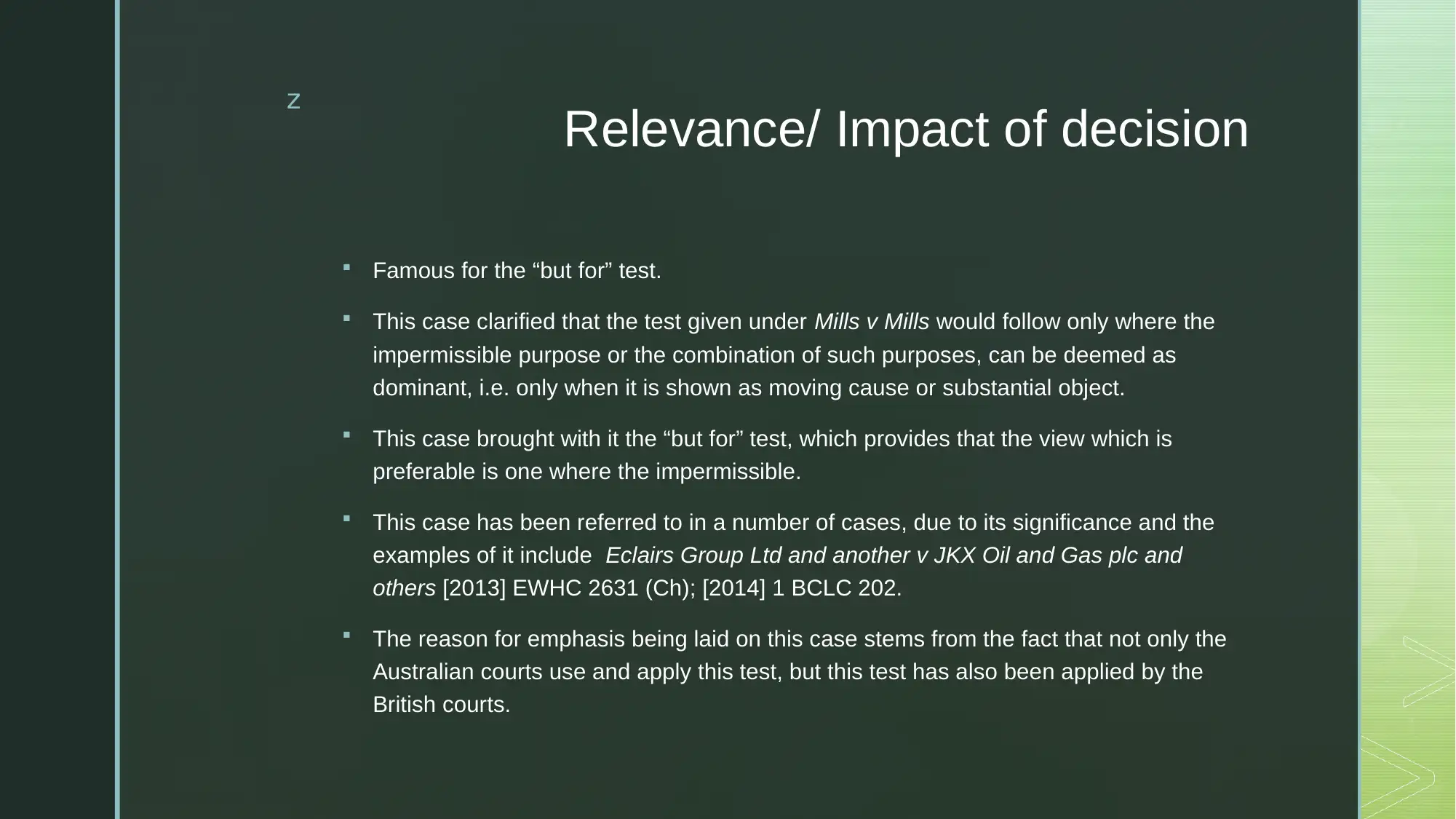
z
Relevance/ Impact of decision
Famous for the “but for” test.
This case clarified that the test given under Mills v Mills would follow only where the
impermissible purpose or the combination of such purposes, can be deemed as
dominant, i.e. only when it is shown as moving cause or substantial object.
This case brought with it the “but for” test, which provides that the view which is
preferable is one where the impermissible.
This case has been referred to in a number of cases, due to its significance and the
examples of it include Eclairs Group Ltd and another v JKX Oil and Gas plc and
others [2013] EWHC 2631 (Ch); [2014] 1 BCLC 202.
The reason for emphasis being laid on this case stems from the fact that not only the
Australian courts use and apply this test, but this test has also been applied by the
British courts.
Relevance/ Impact of decision
Famous for the “but for” test.
This case clarified that the test given under Mills v Mills would follow only where the
impermissible purpose or the combination of such purposes, can be deemed as
dominant, i.e. only when it is shown as moving cause or substantial object.
This case brought with it the “but for” test, which provides that the view which is
preferable is one where the impermissible.
This case has been referred to in a number of cases, due to its significance and the
examples of it include Eclairs Group Ltd and another v JKX Oil and Gas plc and
others [2013] EWHC 2631 (Ch); [2014] 1 BCLC 202.
The reason for emphasis being laid on this case stems from the fact that not only the
Australian courts use and apply this test, but this test has also been applied by the
British courts.
Paraphrase This Document
Need a fresh take? Get an instant paraphrase of this document with our AI Paraphraser
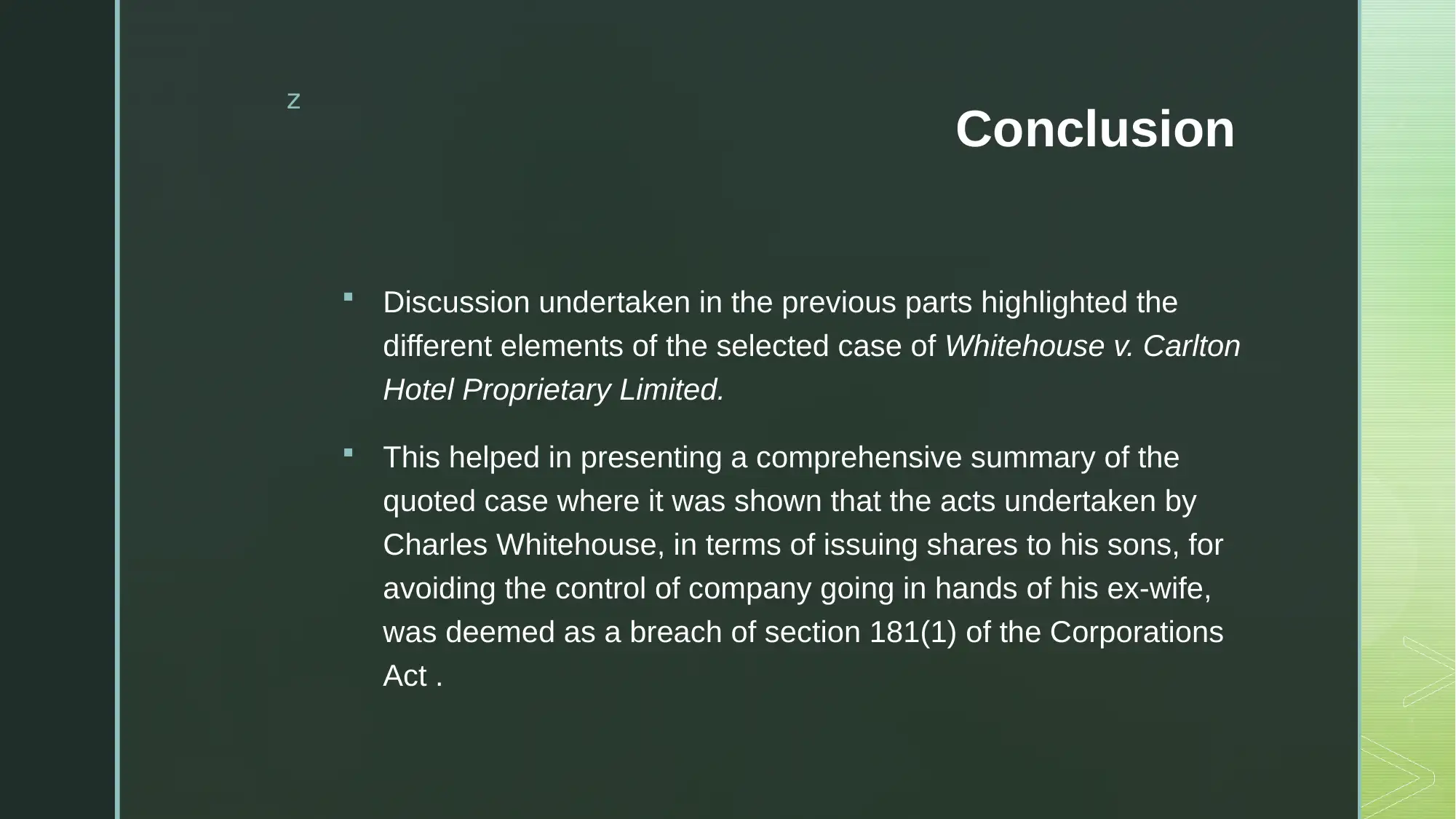
z
Conclusion
Discussion undertaken in the previous parts highlighted the
different elements of the selected case of Whitehouse v. Carlton
Hotel Proprietary Limited.
This helped in presenting a comprehensive summary of the
quoted case where it was shown that the acts undertaken by
Charles Whitehouse, in terms of issuing shares to his sons, for
avoiding the control of company going in hands of his ex-wife,
was deemed as a breach of section 181(1) of the Corporations
Act .
Conclusion
Discussion undertaken in the previous parts highlighted the
different elements of the selected case of Whitehouse v. Carlton
Hotel Proprietary Limited.
This helped in presenting a comprehensive summary of the
quoted case where it was shown that the acts undertaken by
Charles Whitehouse, in terms of issuing shares to his sons, for
avoiding the control of company going in hands of his ex-wife,
was deemed as a breach of section 181(1) of the Corporations
Act .
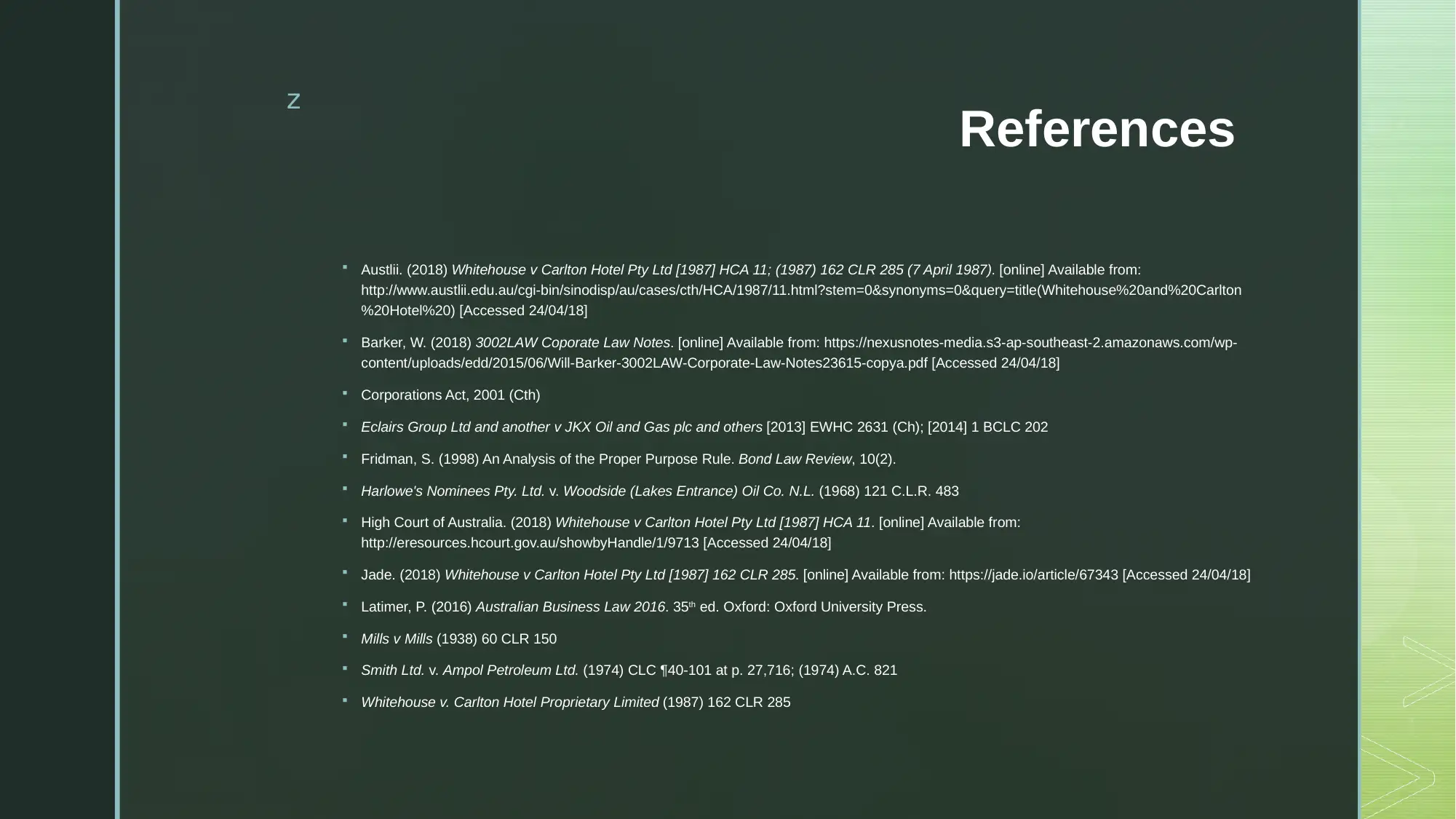
z
References
Austlii. (2018) Whitehouse v Carlton Hotel Pty Ltd [1987] HCA 11; (1987) 162 CLR 285 (7 April 1987). [online] Available from:
http://www.austlii.edu.au/cgi-bin/sinodisp/au/cases/cth/HCA/1987/11.html?stem=0&synonyms=0&query=title(Whitehouse%20and%20Carlton
%20Hotel%20) [Accessed 24/04/18]
Barker, W. (2018) 3002LAW Coporate Law Notes. [online] Available from: https://nexusnotes-media.s3-ap-southeast-2.amazonaws.com/wp-
content/uploads/edd/2015/06/Will-Barker-3002LAW-Corporate-Law-Notes23615-copya.pdf [Accessed 24/04/18]
Corporations Act, 2001 (Cth)
Eclairs Group Ltd and another v JKX Oil and Gas plc and others [2013] EWHC 2631 (Ch); [2014] 1 BCLC 202
Fridman, S. (1998) An Analysis of the Proper Purpose Rule. Bond Law Review, 10(2).
Harlowe's Nominees Pty. Ltd. v. Woodside (Lakes Entrance) Oil Co. N.L. (1968) 121 C.L.R. 483
High Court of Australia. (2018) Whitehouse v Carlton Hotel Pty Ltd [1987] HCA 11. [online] Available from:
http://eresources.hcourt.gov.au/showbyHandle/1/9713 [Accessed 24/04/18]
Jade. (2018) Whitehouse v Carlton Hotel Pty Ltd [1987] 162 CLR 285. [online] Available from: https://jade.io/article/67343 [Accessed 24/04/18]
Latimer, P. (2016) Australian Business Law 2016. 35th ed. Oxford: Oxford University Press.
Mills v Mills (1938) 60 CLR 150
Smith Ltd. v. Ampol Petroleum Ltd. (1974) CLC ¶40-101 at p. 27,716; (1974) A.C. 821
Whitehouse v. Carlton Hotel Proprietary Limited (1987) 162 CLR 285
References
Austlii. (2018) Whitehouse v Carlton Hotel Pty Ltd [1987] HCA 11; (1987) 162 CLR 285 (7 April 1987). [online] Available from:
http://www.austlii.edu.au/cgi-bin/sinodisp/au/cases/cth/HCA/1987/11.html?stem=0&synonyms=0&query=title(Whitehouse%20and%20Carlton
%20Hotel%20) [Accessed 24/04/18]
Barker, W. (2018) 3002LAW Coporate Law Notes. [online] Available from: https://nexusnotes-media.s3-ap-southeast-2.amazonaws.com/wp-
content/uploads/edd/2015/06/Will-Barker-3002LAW-Corporate-Law-Notes23615-copya.pdf [Accessed 24/04/18]
Corporations Act, 2001 (Cth)
Eclairs Group Ltd and another v JKX Oil and Gas plc and others [2013] EWHC 2631 (Ch); [2014] 1 BCLC 202
Fridman, S. (1998) An Analysis of the Proper Purpose Rule. Bond Law Review, 10(2).
Harlowe's Nominees Pty. Ltd. v. Woodside (Lakes Entrance) Oil Co. N.L. (1968) 121 C.L.R. 483
High Court of Australia. (2018) Whitehouse v Carlton Hotel Pty Ltd [1987] HCA 11. [online] Available from:
http://eresources.hcourt.gov.au/showbyHandle/1/9713 [Accessed 24/04/18]
Jade. (2018) Whitehouse v Carlton Hotel Pty Ltd [1987] 162 CLR 285. [online] Available from: https://jade.io/article/67343 [Accessed 24/04/18]
Latimer, P. (2016) Australian Business Law 2016. 35th ed. Oxford: Oxford University Press.
Mills v Mills (1938) 60 CLR 150
Smith Ltd. v. Ampol Petroleum Ltd. (1974) CLC ¶40-101 at p. 27,716; (1974) A.C. 821
Whitehouse v. Carlton Hotel Proprietary Limited (1987) 162 CLR 285
⊘ This is a preview!⊘
Do you want full access?
Subscribe today to unlock all pages.

Trusted by 1+ million students worldwide
1 out of 12
Related Documents
Your All-in-One AI-Powered Toolkit for Academic Success.
+13062052269
info@desklib.com
Available 24*7 on WhatsApp / Email
![[object Object]](/_next/static/media/star-bottom.7253800d.svg)
Unlock your academic potential
Copyright © 2020–2025 A2Z Services. All Rights Reserved. Developed and managed by ZUCOL.

![Analysis of Whitehouse v Carlton Hotel Pty Ltd [1987] 162 CLR 285 Case](/_next/image/?url=https%3A%2F%2Fdesklib.com%2Fmedia%2Fimages%2Fdv%2F825a9ad3bb644f299e1b8934c38feb5f.jpg&w=256&q=75)



